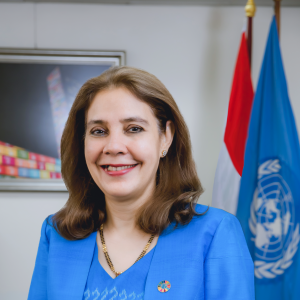- Your Excellency, Pak Nezar Patria, Vice Minister, KOMINFO
- Ibu Itje Chodidjah, Secretary General, National Commission for UNESCO
- Ibu Maki Katsuno-Hayashikawa, Director, UNESCO
- Prof. Ismunandar, Permanent Delegation of Indonesia to UNESCO
I am honoured to join you in support of Indonesia’s readiness assessment for AI to ensure this critical technology’s inclusive, ethical and innovative use.
I am new to Indonesia and today provides me with a great learning opportunity.
Indonesia is the first country in Southeast Asia to implement UNESCO’s readiness assessment methodology, which is a testament to the government’s leadership on AI across ASEAN.
Let me also welcome representatives from Cambodia, Laos, Thailand and Viet Nam who join us to learn from Indonesia’s approach.
AI has great potential to accelerate progress on the SDGs.
It has significant impacts in optimizing energy consumption, enhancing medical diagnostics, monitoring biodiversity and broadening access to education.
AI can also help with inclusion. For instance, Bu Mira, a new online chatbot, assists women in developing SME businesses through financial tools and support for loan applications.
This enables women entrepreneurs to better utilize financial services and accelerate the growth of their businesses.
As this example shows, the private sector will play a crucial role in scaling up the use of AI.
AI can benefit both bottom lines and circularity by boosting competitiveness and resource efficiency.
Even though only one in two CEOs in Indonesia are using generative AI for business operations they believe that AI will help them build trust with stakeholders and improve product and service quality.
In tandem with the scaling up of AI in the private sector governments will need to create a robust regulatory framework to mitigate risks.
AI can displace jobs, threaten data privacy, and intensify bias and discrimination.
The UN Secretary-General has highlighted the need for rules and safety as AI is controlled by opaque algorithms beyond human understanding.
That is why the collaboration between Kominfo, UNESCO and ITU becomes even more important as the UN connects innovators and policy makers for technical and policy standardization.
Indonesia is taking AI governance seriously to harness the power of AI and digital technologies.
The government’s national strategy for AI is in line with the UN’s vision to ensure its ethical and inclusive use.
These values are in alignment with Indonesia’s Pancasila philosophy and are also reflected in the UNESCO’s recommendation on the Ethics of AI.
Today’s event is a milestone and shows the strong commitment by the government to establish national regulations for the development and use of AI.
Let me touch on one more related issue: the digital divide, which is geographic and generational, but also exists between genders.
Women make up 56% of graduates in the country, but only a third of them have degrees in technology and only a fifth work in technology-related sectors.
That is why there is a pressing need for far more women to choose careers in STEM and the IT sector. This will boost gender equality and accelerate the SDGs, which require a strong basis in science, technology and innovation.
Digital literacy also needs to extend beyond technical and practical abilities, emphasizing foundational skills, especially for younger generations.
The UNESCO-Readiness Assessment Methodology will be an asset in identifying opportunities in infrastructural, educational, and socio-economic investment to bridge the digital gap.
We are proud to be working with Indonesia in this endeavour.
It is an example of how the UN can support the country in the application of international standards and best practices.
I wish you a fruitful discussion.
Terima Kasih


